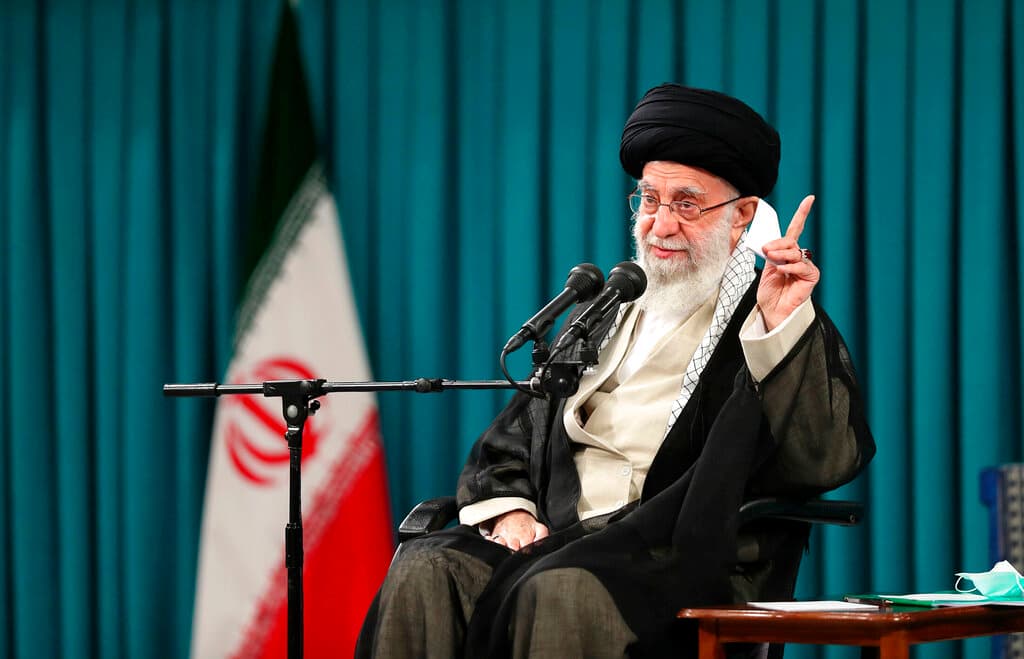Is Tehran Setting a Dare for America as the Islamic Republic Threatens Israel?
Iran appears to be playing the long game, waiting for America to reduce its Mideast military presence, which it has beefed up to avert an all-out regional war, before carrying out its long-promised retaliation against Israel.

Iran is now saying that its weeks-long vow to attack Israel may be postponed for a long while. Is the Islamic Republic waiting for America to reduce its Mideast military presence, which it has beefed up to avert an all-out regional war?
“Time is on our side and the waiting period for this response to the criminal Zionist regime may take a long while,” a spokesman for the Islamist Revolutionary Guards Corps, Brigadier General Ali-Mohammad Naini, said Tuesday. “Not a single attack on Iran has ever remained unanswered, and the enemy should expect measured and precise strikes in due time.”
General Naini is the IRGC’s specialist in psychological warfare, and his statement might represent a strategy of keeping the Israeli military on alert and the country’s citizens in a constant state of anxiety. Iran may also be daring America to allow its forces in the region to dwindle.
Supreme Leader Khamanei has vowed to avenge the July 31 killing of Hamas’s political chief, Ismail Haniyeh, at Tehran, which was widely ascribed to the Mossad. The arch-terrorist and his bodyguard visited Iran to attend President Pezeshkian’s inauguration.
The attack “created a problem for Khamenei among his main powerbase, the intelligence services,” a founding IRGC member, Mohsen Sazegara, who has since defected to America, tells the Jerusalem Post. Mr. Khamanei’s “first reaction was that we retaliate and don’t stop.”
Yet, Mr. Sazegara adds, Mr. Khamenei, after consulting his military, realized that Iran could hardly defend itself against an Israeli counterattack, so he decided to wait. What might have also convinced him to bide his time was President Biden’s decision to dispatch serious military fire power to the Mideast.
Two carrier strike groups, the United States Ships Abraham Lincoln and Theodore Roosevelt, were sent to the region, along with a nuclear submarine, USS Georgia. America’s most advanced fighter jets, the F-22, arrived too.
The 24th Marine expeditionary unit is also in the Mediterranean to assist in evacuation of Americans in Lebanon should a full war erupt between Israel and Hezbollah. The Lebanese terror organization is threatening to avenge the Beirut killing of its second in command, Fuad Shukr, by Israel.
Yet how long can America’s fire power remain in the region? “As a rough rule of thumb, you can say that carrier strike groups in recent years have deployed somewhere between seven and nine months,” the director of the center on military and political power at the Foundation for Defense of Democracy, Brad Bowman, tells the Sun.
Yet, other crises could erupt that demand attention from the American military. America is facing threats from China, Russia, Iran, and North Korea. The Lincoln group, for one, was redirected to the Mideast from the Pacific. Can it remain if military tensions escalate in, say, the Philippines or Taiwan?
“Many of our resourcing decisions, war plans, and contingent plans,” Mr. Bowman says, “are based on outdated and dangerous assumptions that we’re going to be able to confront one major combat operation at a time and that our adversaries will be polite enough not to give us dilemmas of simultaneous conflicts.”
Meanwhile, the mere presence of American power in the Mideast might not carry the deterrence effect that it is meant to achieve. It is “causing Iran to rethink their retaliation,” the policy director at United Against Nuclear Iran, Jason Brodsky, tells the Sun. Yet, he adds, through several administrations, America has made clear that it is, above all, escalation-averse.
“There is an unwritten rule that Iran can attack anyone and can’t be attacked back,” Mr. Brodsky says. Washington’s “paralyzing fear of escalation is inviting escalation.”
America, Mr. Bowman adds, has the world’s most formidable military. “Unfortunately, our adversaries came to the conclusion that while the United States has the biggest muscles in the weight room, we’re also very reluctant to throw a punch. At some point, if the big bodybuilder is not willing to throw a punch, the muscles become irrelevant or are perceived as irrelevant,” he says.
The Islamic Republic may well wait for the outcome of America’s diplomatic push to end the Gaza war. It could avert the military collapse of Hamas, a member of Tehran’s “ring of fire” of anti-Israel proxies. The IRGC might also groom other proxies, like Hezbollah or the Houthis, to retaliate on its behalf.
Also, the IRGC may attack Israeli or Jewish targets abroad, rather than in Israel itself. It might assume that it can safely launch a missile attack, as Washington would likely force Israel to refrain from counter-attacks. Or it is simply waiting for America to sail away from the region.
Either way, reports that Mr. Khamanei has given up on retaliation altogether may be premature. “I don’t believe it,” Mr. Brodsky says. “The Haniyeh killing is too embarrassing for the regime.”

